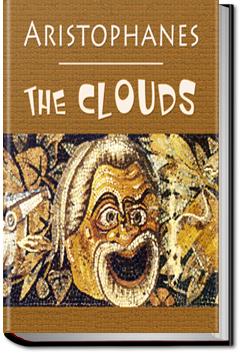UNLIMITED Audiobooks and eBooks
Over 40,000 books & works on all major devices
Get ALL YOU CAN for FREE for 30 days!
Clouds
Aristophanes
Book Overview:
Strepsiades is an Athenian burdened with debt from a bad marriage and a spendthrift son. He resolves to go to the Thinking Shop, where he can purchase lessons from the famous Socrates in ways to manipulate language in order to outwit his creditors in court. Socrates, represented as a cunning, manipulative, irreverent sophist, has little success with the dull-witted Strepsiades, but is able to teach the old man's son Phidippides a few tricks. In the end, the play is a cynical, clever commentary on Old Ways vs. New Ways, to the disparagement of the former.
Strepsiades is an Athenian burdened with debt from a bad marriage and a spendthrift son. He resolves to go to the Thinking Shop, where he can purchase lessons from the famous Socrates in ways to manipulate language in order to outwit his creditors in court. Socrates, represented as a cunning, manipulative, irreverent sophist, has little success with the dull-witted Strepsiades, but is able to teach the old man's son Phidippides a few tricks. In the end, the play is a cynical, clever commentary on Old Ways vs. New Ways, to the disparagement of the former.
How does All You Can Books work?
All You Can Books gives you UNLIMITED access to over 40,000 Audiobooks, eBooks, and Foreign Language courses. Download as many audiobooks, ebooks, language audio courses, and language e-workbooks as you want during the FREE trial and it's all yours to keep even if you cancel during the FREE trial. The service works on any major device including computers, smartphones, music players, e-readers, and tablets. You can try the service for FREE for 30 days then it's just $19.99 per month after that. So for the price everyone else charges for just 1 book, we offer you UNLIMITED audio books, e-books and language courses to download and enjoy as you please. No restrictions.
Try now for FREE!

"Love your service - thanks so much for what you do!"
- Customer Cathryn Mazer
"I did not realize that you would have so many audio books I would enjoy"
- Customer Sharon Morrison
"For all my fellow Audio Book & E-Book regulars:
This is about as close to nirvana as I have found!"
- Twitter post from @bobbyekat



Community Reviews
3.5
The Clouds
I read The Clouds more as a historical source than as a drama. I have read in many texts that this play contributed to Socrates' conviction and death close to twenty years after its debut. I was curious to see what Aristophanes could write that could contribute to the demise of such a
(۱) عوام فریبی ، مغلطه و دروغ گفتن در روز روشن ، سوگند خوردن به روز در شب ، ناحق جلوه دادن حقیقی ترینِ حقوق انسانی ، به حاشیه کشاندن متن و به متن کشاندن حواشی نه تنها مهارتِ سوفیست های باستان بود بلکه سیاستمدارانِ امروزی نیز فرزندان خلف آنان هستند. ریشه ی عوام فریبی و پوپولیسم را میتوان در گذشته های
La commedia “Le nuvole” che leggiamo oggi è una rielaborazione che Aristofane fece (presumibilmente tra il 418 e il 421 a.C.) in seguito alla sconfitta subita alle agóni teatrali del 423.
Si tratta di una versione incompleta sopravvissuta nella forma scritta ma, a quanto pare, mai rappresentata.
Lo s
Sigh. I think I'm in the minority here, but for the most part, I just don't find Aristophanes funny. I found myself reading over passages thinking, Okay, I should be laughing, but probably ended up looking like this the entire time:
That is all.
ترجمه روان است.
مترجم در مقدمه می گوید که اسامی را مطابق تلفظ یونانی آورده، اما دست کم شش جور اشکال در این اقدام او هست.
1. سقراط را دیگر نباید سکراتیس نوشت
2. ذیاس و زئوس به تناوب تکرار شده اند و مراد از هر دو، زئوس است
3. خایرفون را خرفون آورده، با اینکه صورت یونانی آن را در یادداشت ها آورده
ΧΑΙΡΕΦΩΝ
4.
The Clouds may be the best play I've read so far from Aristophanes. It's the cleverest in satire as well as genuinely funny- I mean, if an ancient play can make me laugh as much as an Oscar Wilde play makes me laugh, that's a very, very good sign for what's to come in the future.
In this play, Arist